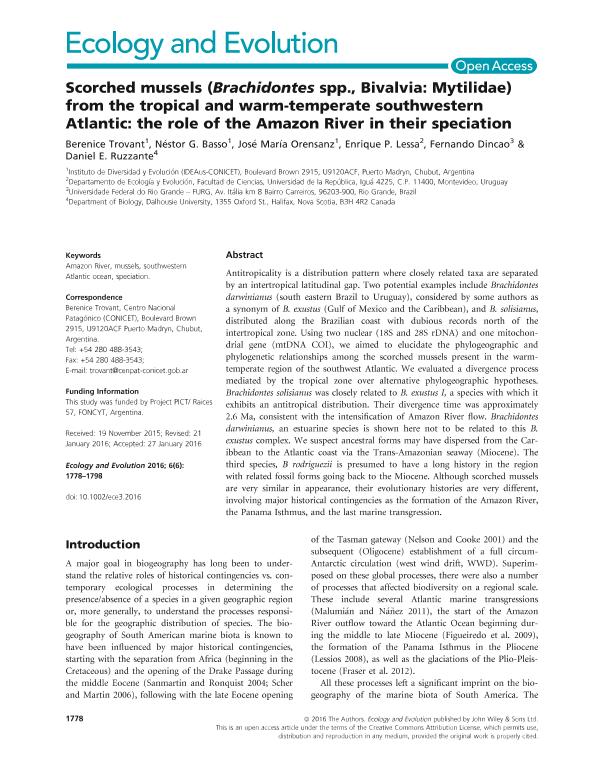Artículo
Scorched mussels (Brachidontes spp., Bivalvia: Mytilidae) from the tropical and warm-temperate southwestern Atlantic: the role of the Amazon River in their speciation
Trovant, Berenice ; Basso, Nestor Guillermo
; Basso, Nestor Guillermo ; Orensanz, Jose Maria
; Orensanz, Jose Maria ; Lessa, Enrique P.; Dincao, Fernando; Ruzzante, Daniel E.
; Lessa, Enrique P.; Dincao, Fernando; Ruzzante, Daniel E.
 ; Basso, Nestor Guillermo
; Basso, Nestor Guillermo ; Orensanz, Jose Maria
; Orensanz, Jose Maria ; Lessa, Enrique P.; Dincao, Fernando; Ruzzante, Daniel E.
; Lessa, Enrique P.; Dincao, Fernando; Ruzzante, Daniel E.
Fecha de publicación:
18/03/2016
Editorial:
John Wiley and Sons Ltd
Revista:
Ecology and Evolution
ISSN:
2045-7758
Idioma:
Inglés
Tipo de recurso:
Artículo publicado
Clasificación temática:
Resumen
Antitropicality is a distribution pattern where closely related taxa are separated by an intertropical latitudinal gap. Two potential examples include Brachidontes darwinianus (south eastern Brazil to Uruguay), considered by some authors as a synonym of B. exustus (Gulf of Mexico and the Caribbean), and B. solisianus, distributed along the Brazilian coast with dubious records north of the intertropical zone. Using two nuclear (18S and 28S rDNA) and one mitochondrial gene (mtDNA COI), we aimed to elucidate the phylogeographic and phylogenetic relationships among the scorched mussels present in the warm-temperate region of the southwest Atlantic. We evaluated a divergence process mediated by the tropical zone over alternative phylogeographic hypotheses. Brachidontes solisianus was closely related to B. exustus I, a species with which it exhibits an antitropical distribution. Their divergence time was approximately 2.6 Ma, consistent with the intensification of Amazon River flow. Brachidontes darwinianus, an estuarine species is shown here not to be related to this B. exustus complex. We suspect ancestral forms may have dispersed from the Caribbean to the Atlantic coast via the Trans-Amazonian seaway (Miocene). The third species, B rodriguezii is presumed to have a long history in the region with related fossil forms going back to the Miocene. Although scorched mussels are very similar in appearance, their evolutionary histories are very different, involving major historical contingencies as the formation of the Amazon River, the Panama Isthmus, and the last marine transgression.
Palabras clave:
Amazon River
,
Mussels
,
Southwestern Atlantic Ocean
,
Speciation
Archivos asociados
Licencia
Identificadores
Colecciones
Articulos(IDEAUS)
Articulos de INSTITUTO DE DIVERSIDAD Y EVOLUCION AUSTRAL
Articulos de INSTITUTO DE DIVERSIDAD Y EVOLUCION AUSTRAL
Citación
Trovant, Berenice; Basso, Nestor Guillermo; Orensanz, Jose Maria; Lessa, Enrique P.; Dincao, Fernando; et al.; Scorched mussels (Brachidontes spp., Bivalvia: Mytilidae) from the tropical and warm-temperate southwestern Atlantic: the role of the Amazon River in their speciation; John Wiley and Sons Ltd; Ecology and Evolution; 6; 6; 18-3-2016; 1778-1798
Compartir
Altmétricas



